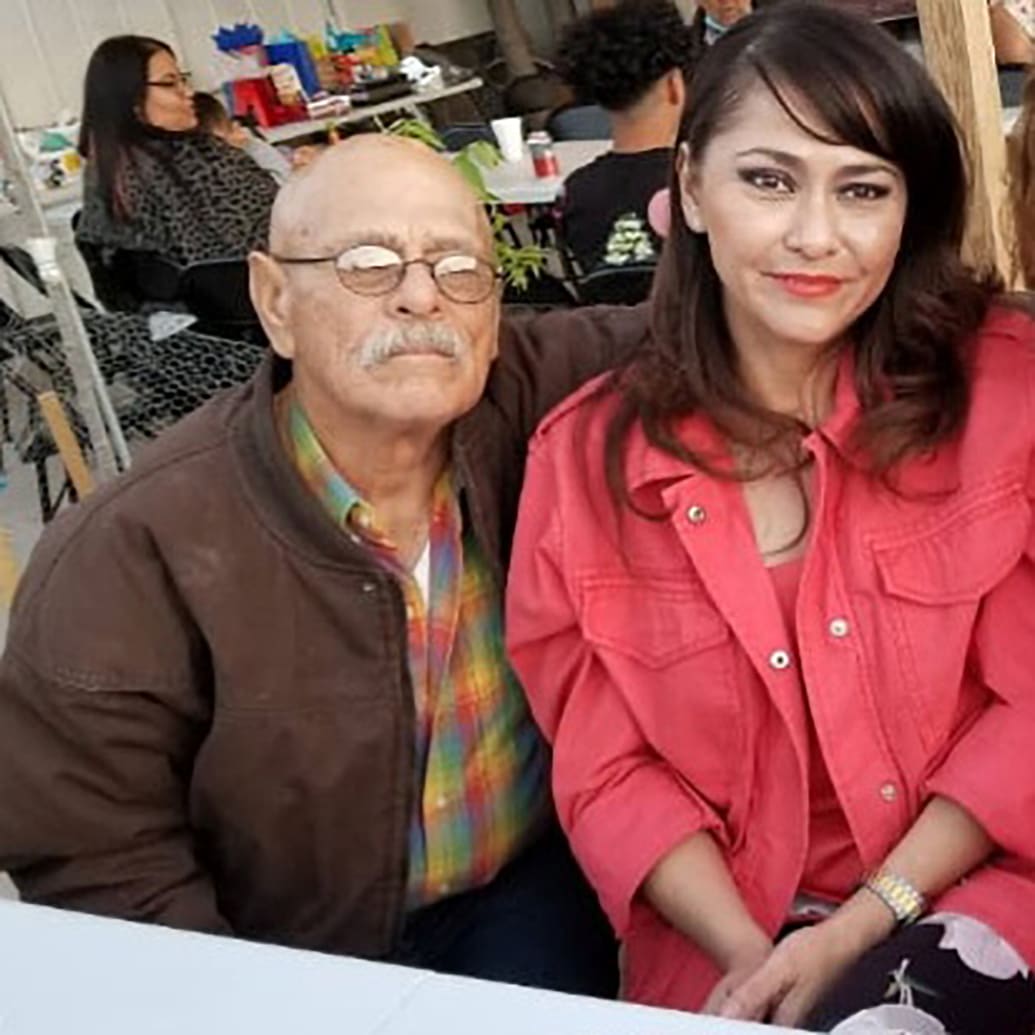In a busy section of Ciudad Juarez, Mexico, Banesa Moreno Navarrete stands on a sidewalk leading to the downtown general hospital.
“This was the walk,” she said, closing her eyes and pressing her hands against her face. “This is where I was always afraid they were going to tell me that my father was dead.”
Her father, Mario Arturo Moreno, was a military veteran who served in the U.S. Army from 1969 to 1972. Deported in 2019, he fell ill in January this year and was checked into a Mexican hospital with a ruptured appendix.
With Moreno becoming increasingly sick, his family quickly applied for humanitarian parole, which would have allowed the ailing veteran to be brought to a U.S. VA hospital across the border, less than an hour’s drive away.
The Juarez hospital had issued a letter, which the family provided to Homeland Security, that described the U.S. veteran’s health as being critical “with a high risk of death in the short term.” This bolstered the family’s hopes that the U.S. government would grant the emergency petition for their father.
Mario Arturo Moreno and his daughter Banesa Moreno Navarrete.
Reyes Mata III
“I had everything set up to take him to El Paso. The ambulance in Juarez would bring him to the bridge, and the transport from the El Paso VA would be there. Everything was in place. We just needed the humanitarian parole,” said Navarrete.
But in a terse response from Homeland Security, the family was told that permission for a deported veteran to enter the United States was “discretionary” and considered to be “an extraordinary measure, sparingly used only in urgent or emergency circumstances.”
The letter, written by Timothy R. Meadows, unit chief for the agency’s Parole and Law Enforcement Programs, was sent via email on Jan. 30. Moreno died from septic infection two days later.
Instead of the U.S. Army veteran being allowed to enter the United States for emergency medical treatment only his ashes were returned to the country which he had served.
“I don’t know if I was mad, or heartbroken, or insulted. I guess all of that,” said Navarrete. “How could they say it was not a true emergency?”
His family acknowledges the crimes Moreno committed—attempted murder and two drug convictions—but said he served his time. Moreno’s deportation, they added, was unrelated to his crimes. He was flagged only because he tried to get a U.S. passport and was unable to provide documentation proving he was legally in the country.
The indignity of Moreno’s last days of life weighs heavy on his daughter, who said she had a very close relationship with him, often “treating him like my son and not my dad.”
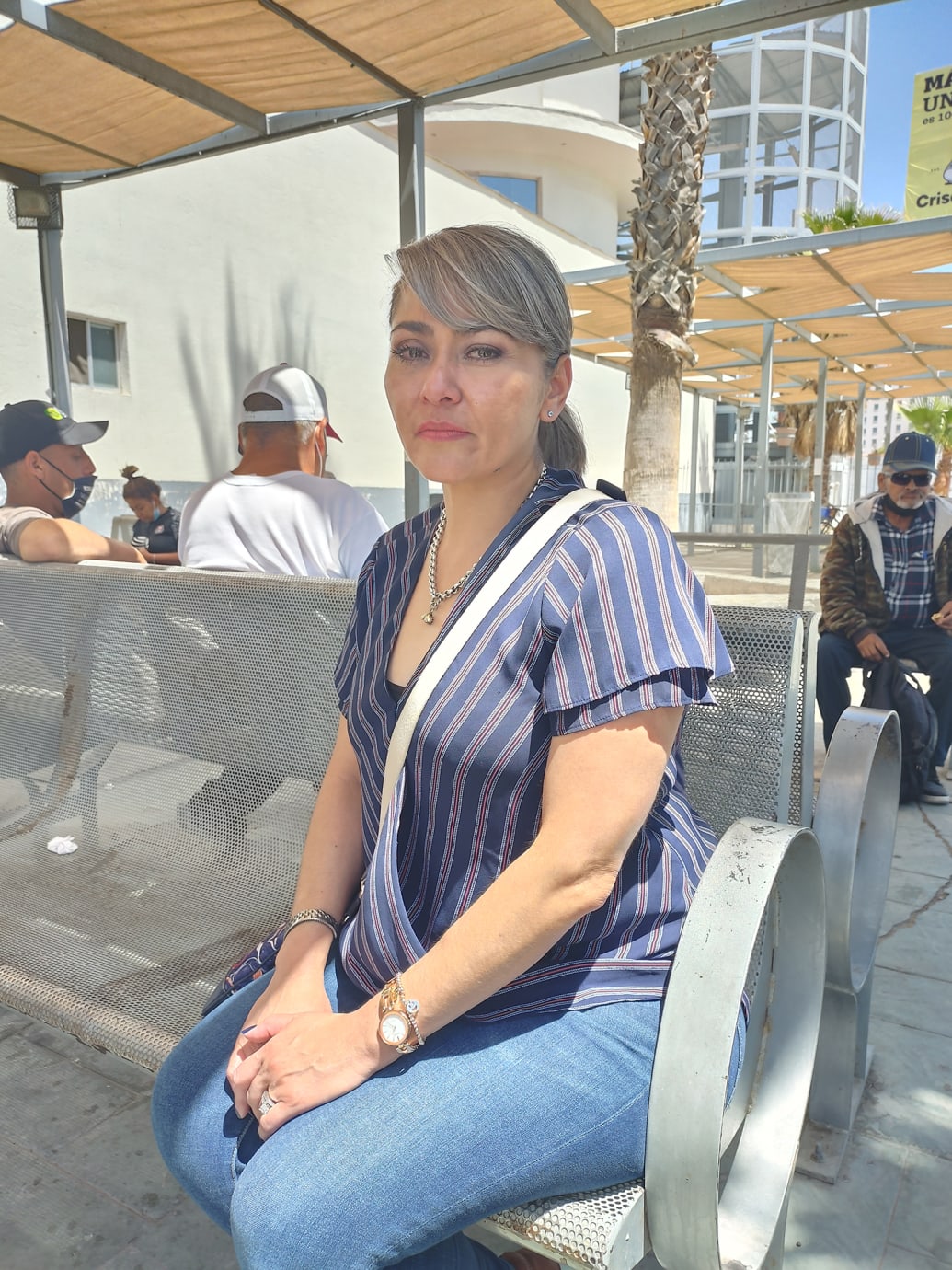
Banesa Moreno Navarrete sitting where she sat when her father Mario Arturo Moreno was in hospital.
Reyes Mata III
She said she tries not to dwell on the denial from Homeland Security, but cannot keep from being angry at the suffering her father endured in a Mexican hospital that could not even provide their own bandages for patients.
“I had to bring them every day,” she said.
Instead of being surrounded by family at his time of death, Moreno was next to a bloodied stranger, one of 27 injured people from a riot at the nearby Cereso state prison where 14 people were killed in an armed cartel attack on the jail.
Instead of the free healthcare that his military service would have provided, the family was forced to take out personal loans to pay the $13,000 hospital bill–which needed to be provided before the hospital would release her father’s body, she said.
Repeated requests for comment sent to the Department of Homeland Security, U.S. Customs and Border Protection, and the U.S. Immigration and Customs Enforcement by The Daily Beast were unanswered.
The plight of deported veterans has come under recent scrutiny after a scathing 2019 government accountability analysis found that the U.S. Immigration and Customs Enforcement agency had been flaunting its own policies meant to protect the rights of now-deported veterans—lacking even an accurate record of how many it has kicked out of the country. Tempers flared as federal lawmakers demanded answers.
“Non-citizen veterans are falling through the cracks of our broken immigration system,” said U.S. Rep. Mark Takano, chairman of the House Veterans’ Affairs Committee, in a statement blasted out after the 2019 U.S. Government Accountability Office report was released. “It is unacceptable to know that veteran deportations could have been prevented if ICE had been following official agency policies.”
While government records show that 250 veterans were placed in removal proceedings between 2013 and 2018 with 92 deported, the nonpartisan Center for Public Integrity estimates that thousands of foreign-born veterans may have been deported.
In February 2021, President Joe Biden issued an executive order to help more eligible deported veterans return to the U.S. But since then only 50 veterans have been granted re-entry into the country, according to a report this year by the Center for Public Integrity.
With inconsistent records on deported veterans, it’s unclear where they might be, but veterans’ assistance experts believe most are in Mexico. They say with PTSD encumbering many servicemen—seven out of every hundred is the official estimation by Veterans Affairs—the tumult of Mexican life amid warring cartel factions is a poor match for anxious former servicemen.
Hyper-vigilance, general confusion, and suicidal tendencies are easily aggravated, sometimes pushing deported vets to thoughts of ending their struggle in a violent impulse common with PTSD.
“All that comes to my mind. Hanging myself, or a shot to the head,” said Noe Zapata-Perez, a 59-year-old former Army National Guardsman who was deported to San Luis Potosi 18 years ago after he failed to renew his green card and was pulled over for driving under the influence.
Zapata-Perez owns a small grocery store in Matehuala named Abarrotes El Charro—Groceries by the Mexican Cowboy—which stocks everything except alcohol, which he gave up as part of his hard-fought sobriety.
“I put a red light when those thoughts come to mind,” said Zapata-Perez, adding that his loyalty is still strong for the United States.
“No tiro la bandera (I never drop the flag). I don’t give that up. I’m a warrior, yeah. I’m a soldier.”
Mexican cartels often approach people with military experience to join their criminal organization, a fear that Zapata-Perez says is constantly on his mind.
“I’m afraid of that. Of cartels coming in to try and recruit me. I always keep an eye out. They have come to ask me for a ‘fee,’” said Zapata-Perez, meaning a regular payment for “protection” which, if denied, often means riling cartel hitmen into unleashing assaults, torching businesses, or murdering the owner, sometimes family and employees as well.
“But I look them in the eye. I’m not afraid. But I think God is doing that for me.”
When Zapata-Perez was 8, he came into the United States with his father, who he describes as a hard-working man, a skilled cook “with no schooling, maybe a second-grade education in Mexico.”
Born in Matehuala, Mexico, Zapata-Perez had a simple life in the mining town, a region picturesque but gripped in poverty.
“I came from el rancho, just a village, then my family came to the U.S. for the American dream, like everyone says,” he said.
He joined the Army National Reserves right after high school and served for 11 years, participated in a tour to Honduras, artillery training in New York, extreme cold weather training in Michigan, and two rotations in the Mojave desert.
“Why can’t Homeland Security forgive me? Maybe I did some stupidity, but that was alcohol related, and I’m done with that,” he said.
The feelings of abandonment by his government are strong, Zapata-Perez said, adding that the only message he’d send to the United States would be for his military comrades.
“Send the chopper, and rescue me. They put me in a war zone with no ammo,” he said. “It’s a war zone after midnight. You can hear the gunshots, ‘bam bam bam.’ You can hear the cartel fireworks.”
Zapata-Perez says he has spent three years trying to get permission to re-enter the U.S. in order to receive medical attention for a back injury as well as urgent dental work but to no avail.
“I filled out documents left and right,” he said. “There’s no VA assistance here in Central Mexico, nothing whatsoever. That’s probably why I drank, to ease the pain, mentally and physically. But I’m clean, now 9 months.’
Perhaps most synonymous with Mexican violence is Ciudad Juarez, a city of nearly 1.5 million people that saw nearly 2,500 violent homicides in 2021 and 2022. It sits just across the border from El Paso, Texas.
Former U.S. Navy serviceman Gerardo “Jerry” Zaragoza has lived in Juarez for the past 18 years. Now 43, he remembers his first entry into the United States as an 8-year-old child crossing on the shoulders of a “coyote”who carried him across the Rio Grande into the United States. The smuggler also pulled a plank strapped onto an inflated inner-tube that carried his mother and younger brother Luis.
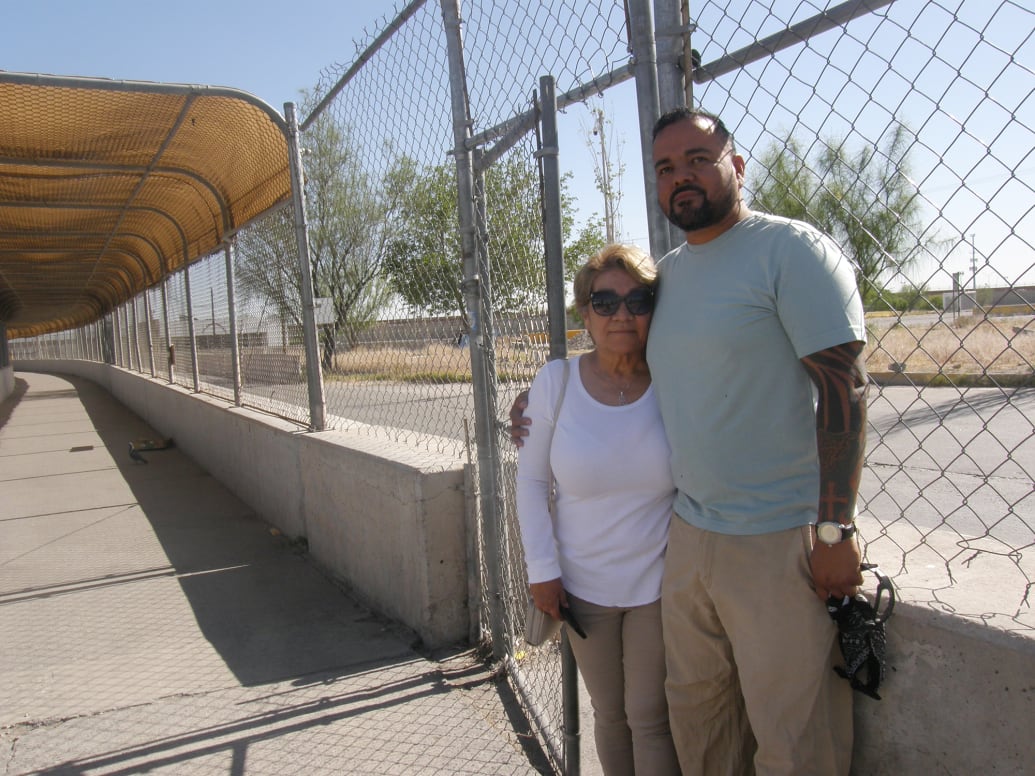
Jerry Zaragoza and his mother Cruz Santillan at the border where they crossed when he was a child.
Reyes Mata III
On a recent Sunday morning, Zaragoza and his mom met on the Mexican side of the international Bridge of the Americas, surveying the edge of the river where they first crossed into the United States 35 years ago.
“I don’t want to relive the past. It is such a terribly sad time for us,” said his mother, Cruz Santillan, who lives legally in El Paso. She stood a short distance from the river, pointing at the Salt Cedar trees lining its edge.
“We walked up to that area, and got by the water to get on the tube. (Jerry) was carried by the man. And I had my little boy with me in my arms, on the wood. I was very afraid because I don’t know how to swim. I was thinking about the future for my kids, for him and his brother.”
After climbing off the makeshift raft onto the river bank, Santillan remembers that a distant U.S. Border Patrol land cruiser was speeding towards her and the group of other people crossing.
“We all started running and we kept running, we were all very afraid,” she said. “My children were crying and crying. (Jerry) was afraid that they were going to take him to jail, and I had to assure him, ‘no it’s going to be okay.’”
They fled into a nearby apartment complex where a relative lived, eventually renting an apartment, and starting their life in the United States.
After high school, Zaragoza joined the military. Illegally, he thinks.
“It was a movida,” he said, a crafty way around a problem because he lacked a permanent resident card. So his Navy recruiter used his employment authorization card, which allows only temporary legal status in the United States.
“But I remember my recruiter’s words exactly. He said: ‘do not tell anybody about your legal status, cause you’ll be in trouble.’ So I never mentioned it to anyone,” said Zaragoza.
Nonetheless, Zargoza said he was eager to move up in the Navy ranks.
“I was as happy as a motherfucker because I thought I was gonna be a badass killing machine, a part of the Navy SEALs.”
Then he learned something that crushed his hopes: Only U.S. citizens could advance to the SEALs. Also weighing on him was rampant racism he said was coming from some of his commanding officers.
“Mexicans this and Mexicans that. It was very uncomfortable,” he said. Eventually, his morale tanked. “I was too depressed to stay. I was younger and really stupid. But it all took a toll on me. Making fun of me and my race, I got tired of taking that shit. I was drinking three or four bottles of Jack Daniels each week. That would take the pain away.”
“I lost the thing that I thought I could be for my country, a Navy SEAL. Well, for what I thought was my country,” he said. “I went AWOL and got a dishonorable discharge.”
He settled into El Paso life, including regular trips into Juarez. When he was 25, walking back from Juarez with his brother after a trip to a favorite Mexican restaurant, his illegal status caught up with him.
“I remember at the bridge saying ‘U.S. citizen’ and then the CBP guy said ‘show me your ID.’ Sure thing. Here you go,” Zaragoza recalls telling the border agent. “I actually forgot that my work permit had expired. Really, as far as I knew, I was a U.S. citizen. I had been in El Paso for so long.”
“They said I was imitating a U.S. citizen. I was deported. I thought it would be temporary. But it has been 18 years. I think it is permanent,” he said.
Life in Mexico means barely escaping random violence, constant vigilance, and sometimes just closing his eyes to his reality.
“I don’t watch the news. I don’t watch nothing like that because it’s just bad news. If you don’t hear that they killed 5 people that night—and this is that night only—then that means you’re not in Juarez.”
While at a Juarez restaurant a few years back, he said he saw a group of men swarm inside so he quickly left. Hearing a series of shots behind him, turning back, he saw a man bloody and shot to death–“his face was in the damn soup,” he said.
Often wary of leaving his home, he said life in Mexico is a state of oppression, something entirely unfamiliar to people in the United States, he said.
“The way they live here, it’s bad. Everybody has to settle for whatever shit they throw at them. It’s bad because of the way you can’t rise up and say ‘no you can’t do that’ because you’re afraid that they might kill you,” he said.
Zaragoza, who suffers from depression, a back injury, and suspected PTSD, had one attempt at humanitarian parole rejected last year, he said, for reasons Homeland Security has not disclosed. He’s working on another one.
In Tijuana, the huge Mexican city of more than two million across the border from San Diego, California, violence has racked up an average of more than 2,000 killings each year for the past three years. Last year cartels hijacked and torched more than a dozen vehicles in a series of escalating violent acts that forced the city to enact a curfew for its residents.
“That was right down the block from me,” said Edwin Salgado, a former U.S. Marine deported to Mexico in 2016. That violence was just a snapshot of the chaos in the city, he said.
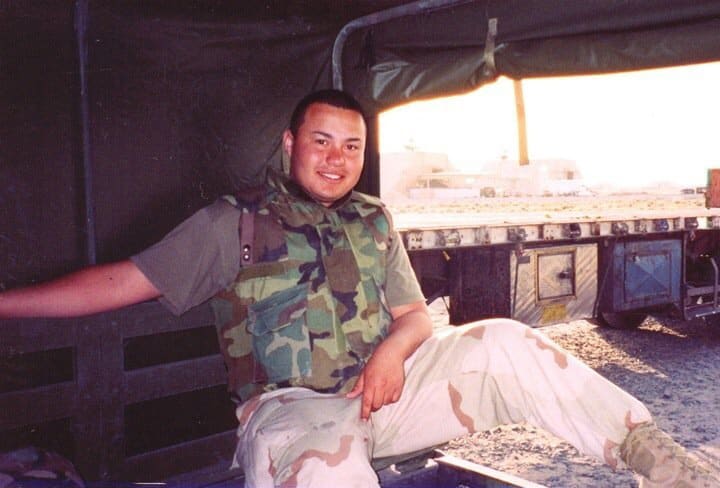
Edwin Salgado.
Reyes Mata III
“Someone was killed a half block away from me, and I’ve known people that have been tortured and killed. It’s crazy.”
Salgado said he’s been bludgeoned and robbed in Tijuana, once by a group of men hired by a local business owner who pointed a gun at him and threatened to have him killed and buried “where I wouldn’t be found.”
He was born in this border town in 1981, then came into the United States with his parents when he was three. At age nine, his father died, an event that pushed him into the Marines, he said, “because it was the hardest… and I had something to prove to myself.”
He enlisted at 18, and was among the first 100 Marines who landed on the ground for the Iraq War, where he provided security, worked with military police to escort people off the base, as well as guarding POWs.
“We basically set everything up. That was 18-hour days, six days a week. Sunday was a 12-hour day,” he said.
After his tour, his entry to civilian life was difficult, he said. The economic downturn meant fewer hours at work, and a failed marriage. He left his home, and things spiraled out of control.
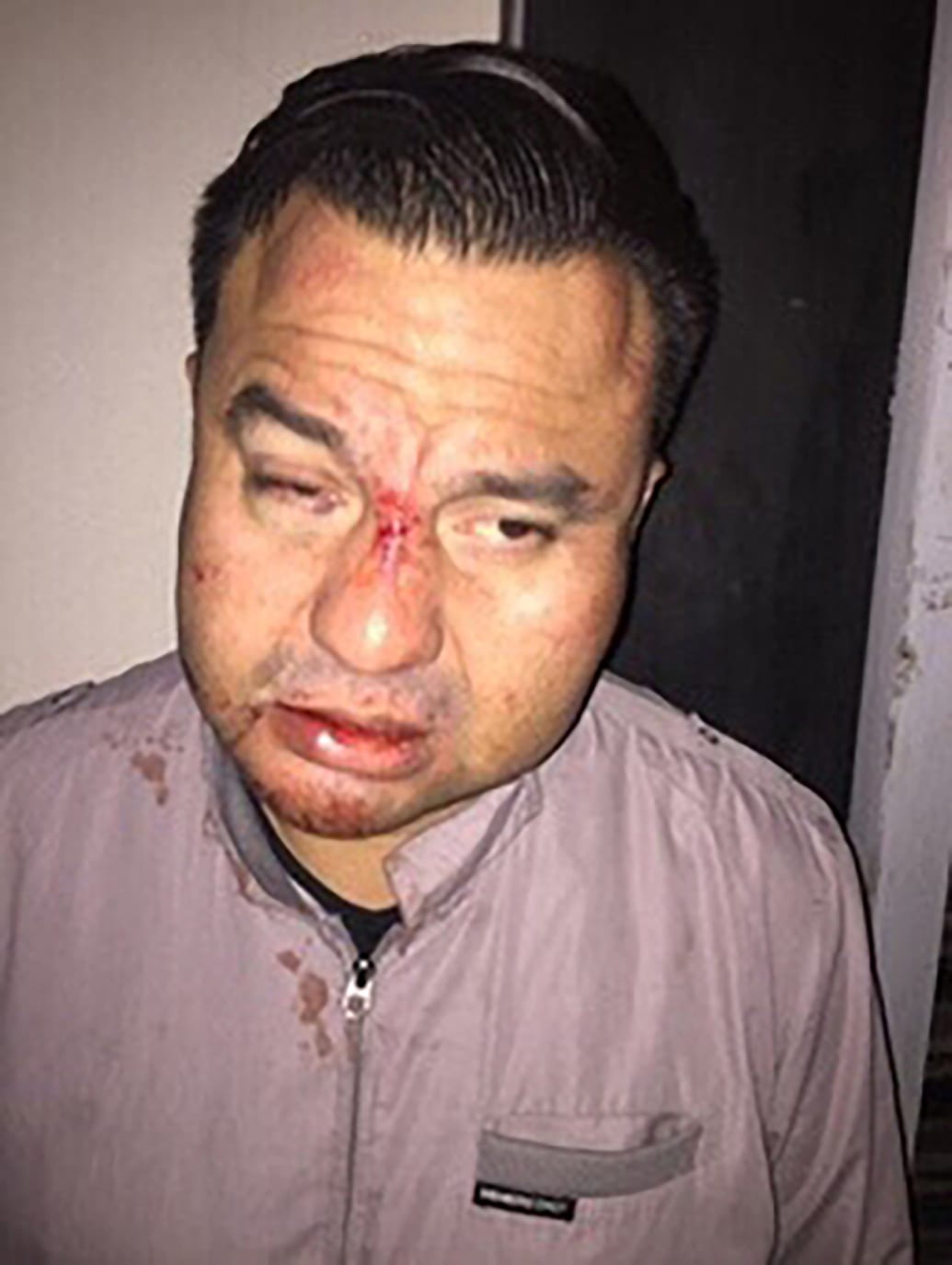
Edwin Salgado after being beaten in Mexico.
Reyes Mata III
“I started using, and using led to selling. That’s what got me into trouble,” he said. “I was arrested in Buena Park with a pound of meth and a handgun in my car.”
He was bailed out, but police raided his new home a week later, destroyed his floor looking for narcotics, and his furious landlord kicked him out.
“I had nowhere to go, so I was living out of my car,” he said. Then, he sold drugs to an undercover officer, was arrested and jailed for a year before being deported.
“The Marine Corps basically prepared me for anything. One of the things that I learned in the Marine Corps is it could always get worse,” he said.
Now sober, he has adjusted over the last 7 years to civilian life in Mexico. The most difficult part of his deportation is not knowing his daughter, Paulina, he said, who is close to turning six.
“I haven’t spoken to her or seen her in around four or five years. I cry when I start talking about her, or thinking about her. It’s hard,” he said.
But he said he does not plan on leaving Mexico, even if he was successful in his petition to be allowed entry. He is active in assisting other deported veterans in Mexico, and has painted murals on the border wall in Tijuana to keep the plight of deported veterans in the public’s eye.
“I don’t plan on moving back to the states. I just want to be able to go to the VA to get treatment for my PTSD, get my meds there, visit my mom and be able to see my daughter. That’s all I really want,” he said.
He said he understands that he is living with the consequences of his mistakes, and feels no sense of betrayal from the United States.
“I’m responsible for my actions, and I’ve never blamed anyone else for what’s happened to me. I chose this path,” he said. “It’s not that that’s the path I wanted, but it’s the path that I took. So I don’t blame anyone other than myself.”
In El Paso, Perez-Zaragoza hugs his mother at the bridge. She was ready to walk back to the U.S. city where she had tried to bring her children for a better life.
“You’ve made sacrifices for me and my brother, you”ve done so much,” he said. “We could not have asked for a better mother.”
As she walks away, he turns and heads back to the busy intersections of Juarez.
“This is sad. I know she has to go, and I know I have to stay here,” he said. “Right now I feel like I can just go across the bridge and go home, walk back with her, but that’s not going to happen. I just have to take it a day at a time.”

